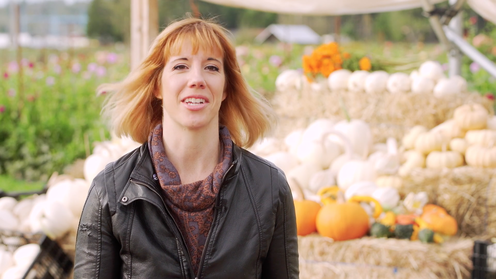 Sara Southerland, Food & Farming Director for Bellingham's Sustainable Connections, talks about small farmers like Triple Wren moving toward more sustainable practices. Sara Southerland, Food & Farming Director for Bellingham's Sustainable Connections, talks about small farmers like Triple Wren moving toward more sustainable practices. In 2012 they founded Triple Wren Farms and began selling cut flowers to local retailers. Their farming success was the result of a combination of lots of hard work and a desire to understand the ecosystems of the Pacific Northwest. After some experiments, they settled on their ideal primary crop: dahlias. The brightly-colored blooms range from two inches in diameter up to a foot, and though they originally come from the mountains of central Mexico, Steve believes their ideal habitat is right here in Whatcom County. “Dahlias like to have really hot days followed by really cold nights, and we have that along with a really long growing season. No other part of the country can grow dahlias as well as we can,” Steve explained. A visit to the farm proves him right: row upon row of dahlias–over 8500 of them–as well as blueberries, pumpkins, and a number of other perennials. Of course, great flowers require great soil conditions, and Steve and Sarah use holistic management practices that promote healthy plants. They use landscape fabric to control weeds and water with ultra-high efficiency drip irrigation. But it’s their pasture rotation that really makes the entire system work so well. At the end of each growing season the family removes the dahlia tubers from the ground, then moves their pigs onto the field. Over the next season the hogs will turn over the soil and eat weeds and any leftover tubers that may carry disease or blight. After pigs come chickens, which eat up insects and other pests. The manure from the pigs and chickens will put important nutrients back into the ground so that when the dahlia rotation comes back around to that field, it will be ready with clean, healthy, and fertile soil. The Pabodys don’t stop at direct land management practices: they now host a number of bee hives. Steve manages and collects honey from the hives which include several mason bee blocks around the property. They’ve even left a number of unmanaged areas throughout their acreage to encourage the growth of native bees and other beneficial pollinators. In addition to the benefits of better growing conditions, their management practices have earned them a “Salmon Safe” farm certification. They now sell wholesale and retail cut flowers, open up their farm for seasonal blueberry and pumpkin sales, and distribute their dahlia bulbs across the country. The quality of their product speaks for itself, and is yet another testimony to the hard work and excellent management practices of family farms here in Whatcom County.
0 Comments
Your comment will be posted after it is approved.
Leave a Reply. |
AuthorWrite something about yourself. No need to be fancy, just an overview. Archives
November 2023
Categories
All
|

 RSS Feed
RSS Feed